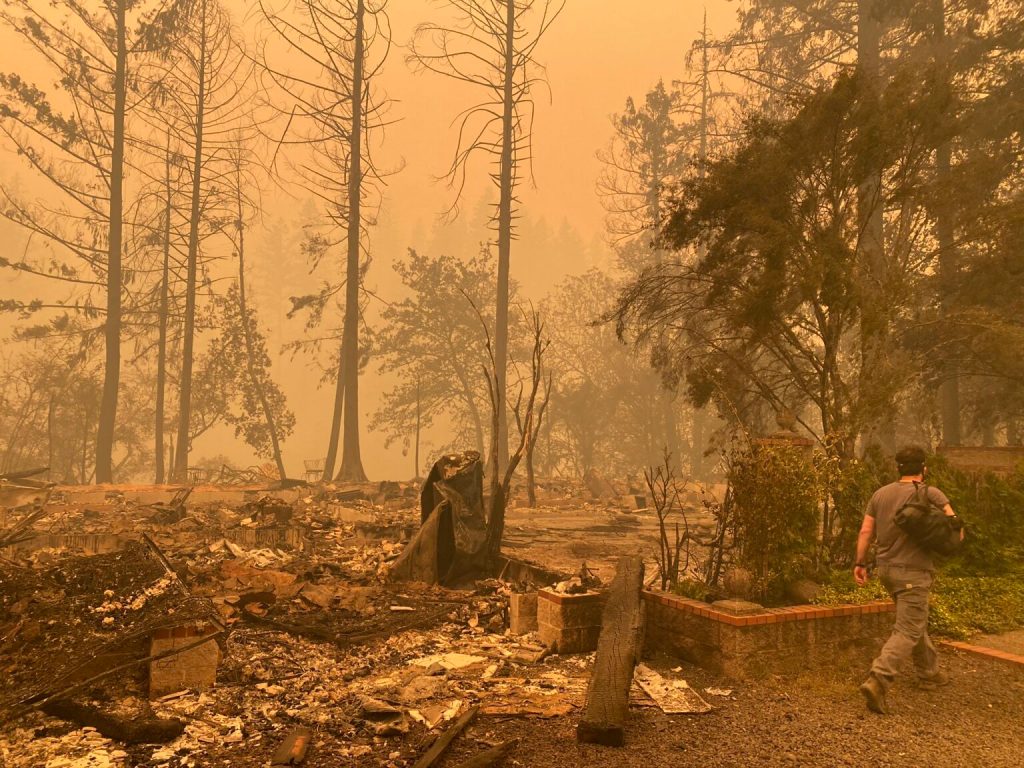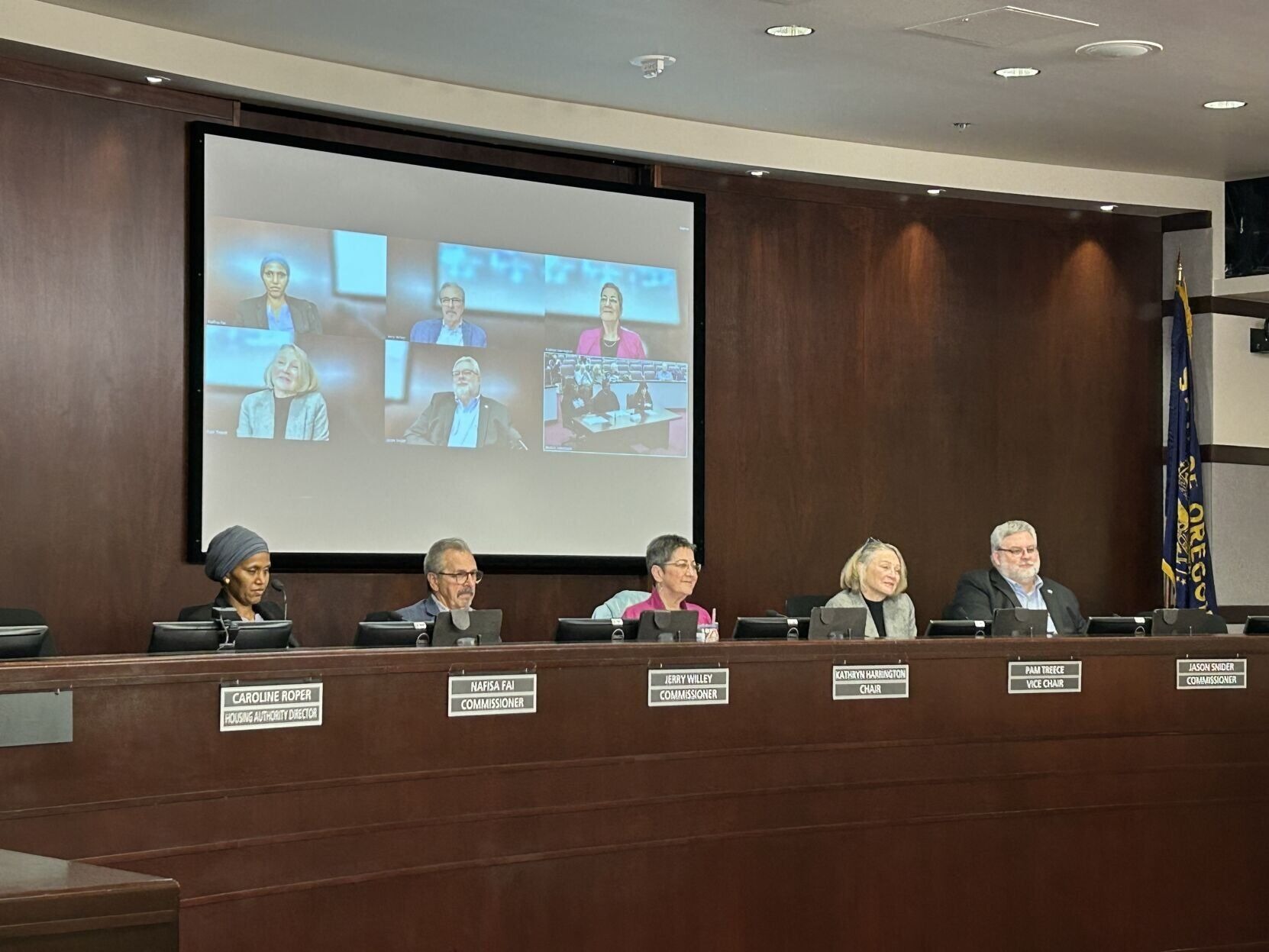Oregon wildfire survivors to pay federal taxes on settlements next year after state bill failed
Published 6:55 am Friday, July 25, 2025

- Sam Drevo walks by the burned foundation of his mother’s home in Gates following the 2020 Labor Day fires. (Photo courtesy of Tyler Westfall)
A proposal to require utilities cover federal income taxes on settlements paid to powerline-ignited wildfire survivors died and a federal law providing relief is set to expire
A bill that would have provided some federal tax relief on settlements paid to survivors of utility-caused wildfires died in the final hours of the Oregon legislative session in June, despite early bipartisan support.
Advocates of the proposal that would have required utilities to cover the cost of federal income taxes on settlements to wildfire survivors attributed the failure to a last-minute decision by Democratic lawmakers to tweak the bill and roll it into a completely different package in the final days of the session.
Because it failed to pass, wildfire survivors who receive settlements from an at-fault utility after January 2026 will have to pay federal income taxes on the settlement, pending intervention from Congress. A federal law exempting such settlements from federal income taxes expires at the end of the year.
Trending
The average award that utility PacifiCorp, owner of Oregon-based Pacific Power, has paid to survivors of several of the 2020 Labor Day fires is roughly $5 million, according to Cody Berne, an attorney for Portland-based law firm Stoll Berne who represents wildfire victims. Juries have found PacifiCorp responsible for at least four of the catastrophic wildfires that killed nine people and destroyed thousands of homes in September 2020, and many of the affected are still awaiting their day in court.
Under federal income tax rates, that leaves the average fire survivor turning over about one-third of their PacifiCorp settlement to the federal government, Berne said. The Oregon Legislature passed a bill in 2024 exempting settlements from state income taxes.
Requiring utilities to pay
When Senate Bill 926 passed the Oregon Senate in April, it included provisions requiring utilities that cause a wildfire to pay federal income taxes on settlements awarded to survivors.
It also included language prohibiting Oregon’s private investor-owned utilities from recovering wildfire lawsuit costs from ratepayers — including fines, fees and settlements — if the company was found by a court or jury to have acted recklessly or negligently in causing the fire. It also prohibited companies from raising rates to pay for repairing or replacing wildfire-damaged infrastructure if the company was found by court or jury to have been at fault for the fire.
Under the bill, electric utilities indebted by a wildfire judgment and pending trials would not have been allowed to send dividends, income, interest or profits to corporate owners and shareholders and would have had to pay 9% interest on any damages awarded to wildfire victims starting from the date of the fire, rather than the date the damages are awarded.
The underlying point of the bill was to get PacifiCorp to move faster in settling with survivors of the 2020 Labor Day Fires.
Trending
Pacific Power and Portland General Electric opposed the bill, but dozens of wildfire victims submitted testimony and showed up in person to support it. Many senators who voted for the bill referred to the power of public testimony.
But in the House, Judiciary Committee Chair Jason Kropf, D-Bend, changed the bill, adding to it a requirement that the legislature pay a third-party to study “issues related to catastrophic wildfire risk and recovery,” and that the Oregon Public Utilities Commission create a wildfire safety certificate program awarded to utilities that meet state-established standards for good wildfire prevention.
The wildfire certificates are part of an earlier and controversial bill introduced by Rep. Pam Marsh, D-Ashland, and co-sponsored by Kropf. Critics saw it as offering some state-sanctioned liability coverage to utilities should they be in court defending themselves from allegations that they were negligent in causing a powerline-ignited fire.
By tacking on the wildfire risk and recovery study, which would have to be paid for by the state’s general fund, Kropf ensured the bill would be sent to the Joint Ways and Means Committee, where it eventually died without getting a committee vote. Kropf did not respond to an interview request.
Sam Drevo, a survivor of the 2020 Labor Day fires in the Santiam Canyon, said he and other survivors were “abandoned” by Kropf and Marsh, D-Ashland.
“Hundreds of fire victims made the trip to Salem to testify in support of a bill written to hasten settlement of their claims against PacifiCorp for igniting fires that burned their homes and communities,” he said. “We all shared heartbreaking stories of loss, death, suicide and homelessness in our communities.”
A franken-bill
In the last few weeks of the session, Kropf and Marsh were able to salvage the tax relief provision of Senate Bill 926 by rolling it into a placeholder bill, a kind of dummy bill lawmakers introduce early in the session and keeping quietly on hand for the end of the session, so it can be swapped out for a new, emerging proposal.
What became House Bill 3984 got its first vetting by lawmakers on June 27, the very last day of the 2025 legislative session. It would have directed the utilities to cover federal income taxes on wildfire settlements, the state to pay for the wildfire risk and recovery study and the Oregon Public Utilities Commission to establish the wildfire safety certificate program.
The bill passed narrowly on the House floor on June 27, but did not get a final vote in the Senate before the session wrapped late that Friday night.
Wildfire survivors and advocates, including Drevo and Berne, believe that adding the wildfire safety certificate program to the bill ultimately tanked it, and with it, tax relief for wildfire survivors.
Marsh rejects that adding the wildfire safety certificate program tanked the bill.
“It was the last day of session, so getting action on anything was a long shot,” she said in an email. She noted that some lawmakers who had supported the earlier tax bill passed in the Senate were disappointed that so much had been changed by the time it moved through the House.
“From my perspective, given the December expiration of the federal tax protections, the bill would have been a major win for survivors, if not everything that was originally requested in 926,” she said. “That felt worth a last minute hail mary.”
Marsh said she is reflecting on the many conversations she’s had about wildfire and utility liability issues during the session.
“No question that we have to continue to look at the risks facing utilities in these fire prone days,” she said. “I’m sure that other advocates working with survivors have additional ideas of what might be proposed.”








